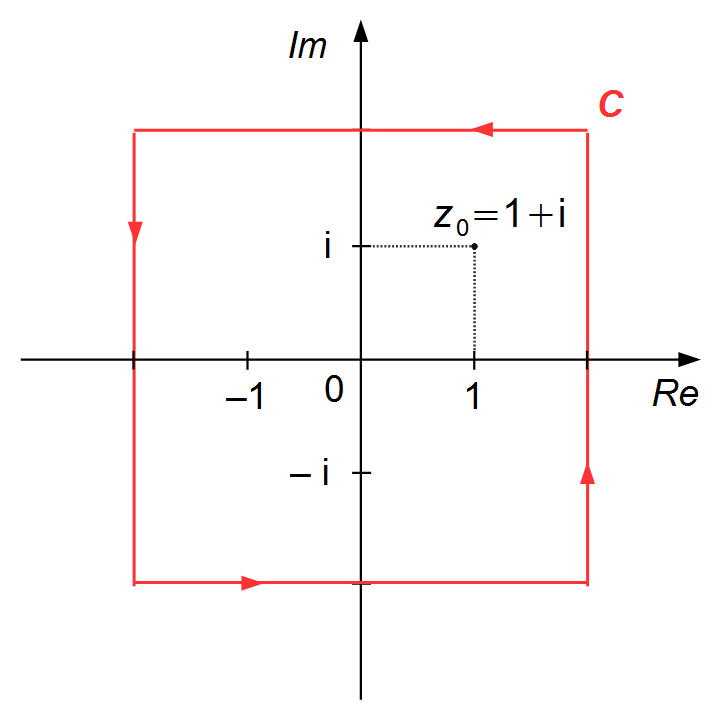Solved Problem on Cauchy's Integral Formula
advertisement
d) \( \displaystyle \oint_{{C}}\frac{z^{2}}{z-1-\mathrm{i}}\;dz \)

The path is given by contour C (Figure 1). Point
\( z-1-\mathrm{i}\Rightarrow z=1+\mathrm{i} \)
is inside the region determined by C.
The Cauchy Integral Formula in the general form is given by
The Cauchy Integral Formula in the general form is given by
\[
\begin{gather}
\bbox[#99CCFF,10px]
{f^{(n)}(z_{0})=\frac{{n}!}{2\pi \mathrm{i}}\;\oint_{{C}}\frac{f(z)}{\left(z-z_{0}\right)^{n+1}}\;dz} \tag{III}
\end{gather}
\]
Identifying the terms of the integral
\[
\begin{gather}
\frac{{
\bbox[#FFCC66,2px]
{n}
}!}{2\pi \mathrm{i}}\;\oint_{{C}}\frac{
\bbox[#FFFF66,2px]
{f(z)}
}{\left(z-
\bbox[#FFD9CC,2px]
{z_{0}}
\right)^{
\bbox[#FFCC66,2px]
{n}
+1}}\;dz=\oint_{C}\frac{
\bbox[#FFFF66,2px]
{z^{2}}}
{\left[z-
\bbox[#FFD9CC,2px]
{(1+\mathrm{i})}
\right]^{
\bbox[#FFCC66,2px]
{0}
+1}}\;dz
\end{gather}
\]

\[
\begin{gather}
I_{1}=\oint_{{C}}\frac{f(z)}{\left(z-z_{0}\right)^{n+1}}\;dz=\frac{2\pi\mathrm{i}}{n!}\;f^{(n)}(z_{0})\\[5pt]
I_{1}=\oint_{{C}}\frac{z^{2}}{z-1-\mathrm{i}}\;dz=\frac{2\pi\mathrm{i}}{0!}\;f^{(0)}(0)\\[5pt]
I_{1}=2\pi\mathrm{i}(1+\mathrm{i})^{2}\;\\[5pt]I_{1}=2\pi\mathrm{i}(1+2\mathrm{i}+\mathrm{i}^{2})\\[5pt]
I_{1}=2\pi\mathrm{i}(1+2\mathrm{i}-1)\\[5pt]
I_{1}=2\pi \mathrm{i}(2\mathrm{i})\\[5pt]
I_{1}=4\pi\mathrm{i}^{2}\\[5pt]
I_{1}=4\pi \times(-1)
\end{gather}
\]
\[
\begin{gather}
\bbox[#FFCCCC,10px]
{\oint_{{C}}\frac{z^{2}}{z-1-\mathrm{i}}\;dz=-4\pi}
\end{gather}
\]
Note 1: We do not need to know the equation that describes the contour C for the
calculation, it is enough to know if the singularity points are inside or outside the region determined
by the contour.
Note 2: f(0) represents the calculation of the function at the point z0 without derivative.
Note 2: f(0) represents the calculation of the function at the point z0 without derivative.
advertisement

Fisicaexe - Physics Solved Problems by Elcio Brandani Mondadori is licensed under a Creative Commons Attribution-NonCommercial-ShareAlike 4.0 International License .